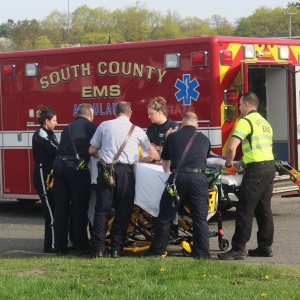$85K in grant money to support water use study, purchase of leak detection equipment
|
Published: 04-17-2025 12:35 PM
Modified: 04-17-2025 6:15 PM |
The Greenfield-based Franklin Regional Council of Governments and the Mass Rural Water Association in Northfield have been awarded a total of $85,419 as part of the state’s inaugural Drought Resiliency and Water Efficiency Grant Program.
In response to increasing droughts across the state, the Executive Office of Energy and Environmental Affairs launched the new grant program to fund drought planning and water system equipment upgrades. FRCOG and the Mass Rural Water Association were two of 13 organizations selected to receive some of the nearly $500,000 available, with the funds supporting a regional water use study and future drought planning as well as the purchase of upgraded leak detection equipment.
FRCOG’s Senior Land Use and Natural Resources Planner Andrea Donlon explained FRCOG has until June 30 of this year to use its allocated $50,000 to complete a needs assessment for public water suppliers across Franklin County. FRCOG staff will work with the various water commissions to analyze water use, consider how to prevent waste and plan for future droughts.
“We’re excited to work on this project and glad the state has created funding for drought planning,” Donlon said. “We want to get a better understanding of how many households each of the water districts in the county serves and how much water is used. What is the state of water use and water planning in our communities?”
Donlon said FRCOG hopes to expand this work in the future, and will be seeking additional grants to fund more in-depth studies and planning that will consider specific water needs such as water use by fire departments.
“They sometimes fill their trucks with pond or river water, but if there’s a drought and that water level is depleted, that diminishes their available resources,” Donlon said. “This is the beginning of a larger look at water needs.”
Donlon said FRCOG will also be working with the Mass Rural Water Association on leak detection training for Franklin County’s various water districts.
The Mass Rural Water Association, which is the Massachusetts chapter of the National Rural Water Association, was awarded $35,419. Bruce Young, deputy executive director and water resource planner of the Mass Rural Water Association, said the funding will be used to buy a leak noise correlator, a tool that helps pinpoint leaks in water systems.
Article continues after...
Yesterday's Most Read Articles
 Conway barn destroyed in blaze likely caused by lightning strike
Conway barn destroyed in blaze likely caused by lightning strike
 Athol man to serve five to seven years on child abuse charges
Athol man to serve five to seven years on child abuse charges
 Northfield man dies in Erving motorcycle crash; Bernardston man injured in Deerfield crash
Northfield man dies in Erving motorcycle crash; Bernardston man injured in Deerfield crash
 Greenfield Planning Board votes against proposed ADU amendments
Greenfield Planning Board votes against proposed ADU amendments
 Rafters rescued from Deerfield River in Charlemont
Rafters rescued from Deerfield River in Charlemont
 Colrain voters to decide on $850K fire truck, meals tax
Colrain voters to decide on $850K fire truck, meals tax
“Our organization is a smaller nonprofit under the National Rural Water Association. We have membership fees but it’s not quite enough to cover large equipment,” Young said. “This equipment is gonna help us reduce the amount of time we spend looking for leaks.”
By using acoustic sensors, the leak noise correlator measures the time it takes for the sound of a leak to travel from the leak location to different points along the pipe to find the precise site of a leak. The new equipment will help water association staff find leaks and water main breaks more efficiently, Young explained.
The Mass Rural Water Association works with water departments across the state that serve communities with populations under 10,000, and conducts regular planned leak tests across Massachusetts.
This past year, water association staff spent 148 days in the field working on leak detections across 45 towns, in addition to water and wastewater system mapping, technical assistance training and other services.
“We’re available to help any water system that needs an extra hand,” Young said.
Reach Madison Schofield at 413-930-4579 or mschofield@recorder.com.








 Wheeler Memorial Library’s Children’s Room reopens after flooding in Orange
Wheeler Memorial Library’s Children’s Room reopens after flooding in Orange Solar panels installed at Fisher Hill Elementary School in Orange
Solar panels installed at Fisher Hill Elementary School in Orange Nationwide, beekeepers report loss of 1.6M colonies in 10 months
Nationwide, beekeepers report loss of 1.6M colonies in 10 months
